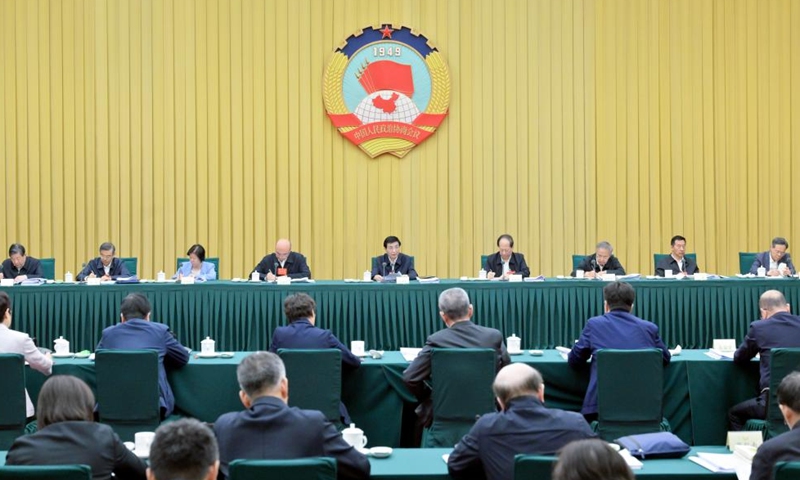Top political advisors meet to discuss high-quality population development

Wang Huning, a member of the Standing Committee of the Political Bureau of the Communist Party of China Central Committee and chairman of the National Committee of the Chinese People's Political Consultative Conference, speaks at a consultation session on promoting the high-quality development of population to underpin Chinese modernization in Beijing, capital of China, May 11, 2024. Photo: Xinhua
The National Committee of the Chinese People's Political Consultative Conference (CPPCC), China's top political advisory body, held a consultation session on Saturday to discuss the promotion of high-quality population development as a means to underpin Chinese modernization, the Xinhua News Agency reported on Saturday.
Wang Huning, a member of the Standing Committee of the Political Bureau of the Communist Party of China (CPC) Central Committee and chairman of the CPPCC National Committee, attended the session and delivered remarks.
Emphasizing the importance of population matters for the sustainable development of the Chinese nation, Wang said the CPPCC should provide insight on major issues related to high-quality population development to facilitate Chinese modernization, according to Xinhua.
He also called for strengthening theoretical support, research and substantiation, as well as the practical effectiveness of consultation and deliberation, by applying Marxist Population Theory to analyze the new population trends, characteristics and problems that China faces.
Nearly 100 CPPCC National Committee members joined the session. Officials from the Committee of Population, Resources and Environment of the CPPCC National Committee were briefed on the research findings, while 23 political advisors and experts spoke.
Chinese Vice Premier Liu Guozhong, a member of the Political Bureau of the CPC Central Committee, stressed that efforts should be made to improve targeted and effective measures of fertility support, and reduce the costs of fertility, child-rearing, and education.
"It is necessary to accelerate the improvement of population governance capacity and standards, coordinate and provide services for the elderly and children, promote the construction of a fertility-friendly society, and accelerate the shaping of a high-quality population development trend with excellent quality, sufficient quantity, optimized structure, and reasonable distribution, in order to support China's modernization through high-quality population development," Liu said, as quoted by the People's Daily.
Wang Peian, a member of the 13th CPPCC and former deputy director of National Health and Family Planning Commission, told the Global Times that population development has always been a fundamental, comprehensive, long-term, and strategic issue related to economic and social development.
In the context of negative population growth, great importance needs to be attached to two major risks and challenges that affect the balanced development of the population - low fertility levels and rapid aging, he said.
"The optimization of population policy, the implementation of fertility support measures, and the promulgation of relevant laws and regulations should all be closely aligned with the overall requirement of high-quality population development in the current and future periods," Wang Peian told the Global Times.
He also pointed out that the key to increasing the birth rate lies in establishing a sound system of policies to support births, including increasing economic support, improving childcare services, optimizing time support, strengthening intergenerational care support, enhancing cultural guidance, and strengthening reproductive health services.
He is optimistic about a slight increase in the number of births in China in 2024. In addition to people's preference to have kids during the Chinese Year of the Dragon, the phase-out of the COVID-19 pandemic, increase in the number of marriages, and optimization of fertility policies are also expected to have a positive influence on the birth rate.